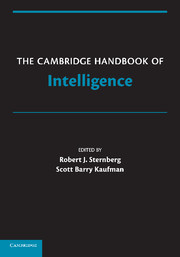Book contents
- The Cambridge Handbook of Intelligence
- The Cambridge Handbook of Intelligence
- Copyright page
- Dedication
- Contents
- Contributors
- Preface
- Part I Intelligence and Its Measurement
- Part II Development of Intelligence
- Part III Intelligence and Group Differences
- Part IV Biology of Intelligence
- Part V Intelligence and Information Processing
- Part VI Kinds of Intelligence
- Part VII Intelligence and Society
- Part VIII Intelligence in Relation to Allied Constructs
- Chapter 35 Intelligence and Personality
- Chapter 36 Intelligence and Achievement
- Chapter 37 Intelligence and Motivation
- Chapter 38 Intelligence and Creativity
- Chapter 39 Intelligence and Rationality
- Chapter 40 Intelligence and Wisdom
- Chapter 41 Intelligence and Expertise
- Part IX Moving Forward
- Author Index
- Subject Index
Chapter 36 - Intelligence and Achievement
from Part VIII - Intelligence in Relation to Allied Constructs
Published online by Cambridge University Press: 05 June 2012
- The Cambridge Handbook of Intelligence
- The Cambridge Handbook of Intelligence
- Copyright page
- Dedication
- Contents
- Contributors
- Preface
- Part I Intelligence and Its Measurement
- Part II Development of Intelligence
- Part III Intelligence and Group Differences
- Part IV Biology of Intelligence
- Part V Intelligence and Information Processing
- Part VI Kinds of Intelligence
- Part VII Intelligence and Society
- Part VIII Intelligence in Relation to Allied Constructs
- Chapter 35 Intelligence and Personality
- Chapter 36 Intelligence and Achievement
- Chapter 37 Intelligence and Motivation
- Chapter 38 Intelligence and Creativity
- Chapter 39 Intelligence and Rationality
- Chapter 40 Intelligence and Wisdom
- Chapter 41 Intelligence and Expertise
- Part IX Moving Forward
- Author Index
- Subject Index
Summary
Keywords
- Type
- Chapter
- Information
- The Cambridge Handbook of Intelligence , pp. 738 - 747Publisher: Cambridge University PressPrint publication year: 2011
- 4
- Cited by

